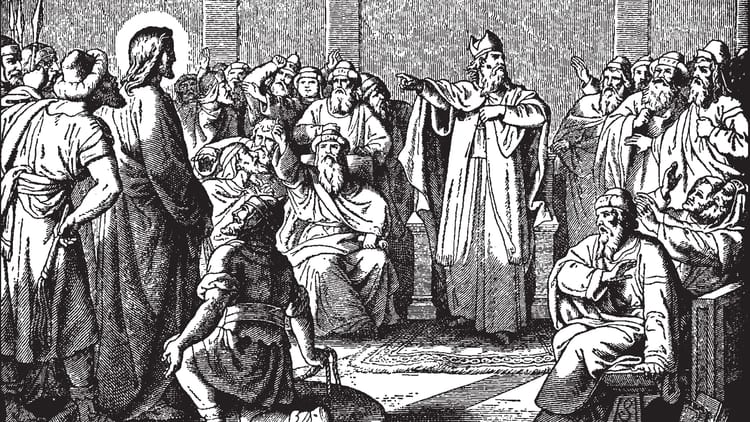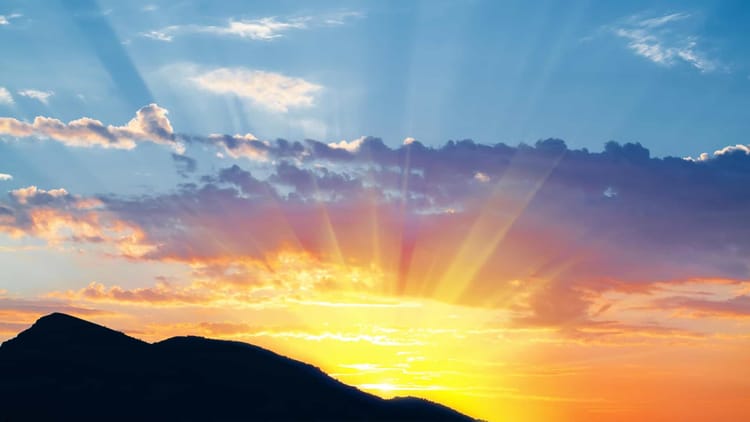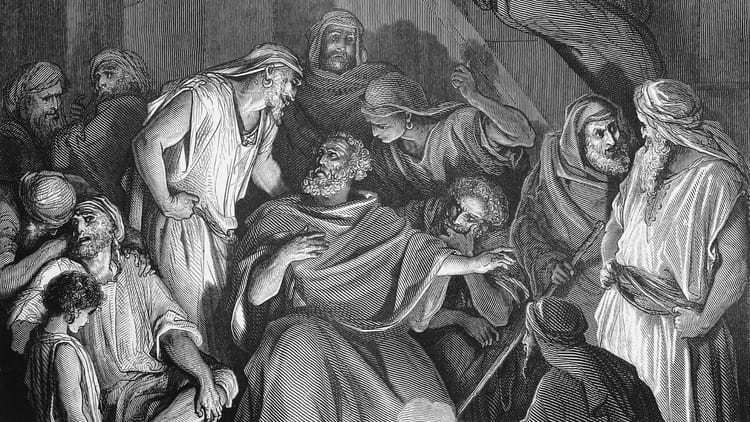The Beginning of the Gospel (Mark 1:1-13)

This morning we’re beginning a new series that’s going to take us all the way to Easter. I’m very excited about this series, because we’re going to be looking at the Gospel of Mark. Of all the subjects that we could look at as a church, there is no better subject than the one Mark writes about: Jesus. And Mark is a great person to tell us about Jesus, because his account is the earliest account of Jesus’ life that was written. What we’re about to read was written just twenty or thirty years after the life of Jesus, and is based on eyewitness accounts. Tradition says that Peter, one of Jesus’ closest friends, told stories of these events. We read:
The hearers of Peter…were not satisfied with a single hearing…but with every kind of exhortation besought Mark…seeing that he was Peter’s follower, to leave them a written statement of the teaching given them verbally, nor did they cease until they had persuaded him, and so became the cause of the Scripture called the Gospel of Mark.
I’m sure that all of us, whether you are a Christian or not, would have loved to sit down with someone who actually knew with Jesus, who had lived with Jesus, and who had seen the stories we’ve heard about take place firsthand. We’d have questions about what it was like and what it felt like to see it with your own eyes.
We can’t do that, of course, because all the eyewitnesses are now dead. But Mark is the next best thing. Mark is the written record of an eyewitness account of someone who was there and saw it all happen. I’m very excited about the subject matter of Mark, and I’m also excited that we get to read the written report of an eyewitness account of somebody who was there and who saw it all.
The passage we read this morning is like a decoder ring. Before the action begins, and before the body of the story begins, Mark gives us a framework, a way of deciphering what’s about to happen. In this opening passage, Mark gives us a preview of the gospel by telling stories that answer three questions: What’s happening? Who’s involved? And what is it going to look like?
So let’s look at these three stories and the questions they answer, beginning with this one:
What’s happening?
Mark 1:1-8 reads:
The beginning of the good news about Jesus the Messiah, as it is written in Isaiah the prophet:
“I will send my messenger ahead of you,
who will prepare your way” —
“a voice of one calling in the wilderness,
’Prepare the way for the Lord,
make straight paths for him.’ “
And so John the Baptist appeared in the wilderness, preaching a baptism of repentance for the forgiveness of sins. The whole Judean countryside and all the people of Jerusalem went out to him. Confessing their sins, they were baptized by him in the Jordan River. John wore clothing made of camel’s hair, with a leather belt around his waist, and he ate locusts and wild honey. And this was his message: “After me comes the one more powerful than I, the thongs of whose sandals I am not worthy to stoop down and untie. I baptize you with water, but he will baptize you with the Holy Spirit.”
If I were to ask you what your week was like this week, a lot of us would say, “It was okay.” If I asked you for more details, you’d probably just say, “It was like almost any other week. Monday came, followed by Tuesday, followed by Wednesday, and so on.” Most of life is the numbing routine of getting up and repeating the same actions, brushing the same teeth, getting stuck in the same traffic, washing the same dishes, over and over and over again.
When the events we’re about to read took place, life was pretty much like that. You get used to the daily rhythm of life no matter how good or bad it happens to be.
For the people who lived at that time, things were more bad than good if they looked at them closely. They had heard stories of how God had moved in the past: how he had spoken to Moses from a burning bush; how he had sent plagues on the Egyptians to rescue his people out of slavery; how he had parted the sea in two so that his people could pass through; how we had spoken from Sinai and made a covenant with his people. But that had been a long time ago. That was then and this is now. And now looked nothing like that. God had not spoken in hundreds of years. There had been no miracles in recent memories. No prophets had spoken. What’s worse, God’s people were once again under foreign rule.
You get used to this. You never quite stop believing in God, but you sure don’t see his hand in the present. You speak of God, but more as a memory than as a present reality. And you believe the future promises of what God is going to do, but you sure don’t expect it to happen in your lifetime. You’ve settled in, and it’s hard to believe that tomorrow is going to be much different than today.
It’s in that context that we read these opening verses. The first thing that strikes you is that it’s a new beginning: “The beginning of the good news about Jesus the Messiah…” It almost takes you back to Genesis 1:1: “In the beginning God created the heavens and the earth.” This is almost like a new creation account. God has broken into the sameness of everyday life, and something big is about to happen.
What exactly is it? In verses 2 and 3, Mark quotes from some Old Testament prophecies. These prophecies spoke of a day that God would break into human history and shake things up and return them to the way that they ought to be. Both Isaiah and Malachi had spoken of a day that God himself would come. His glory would be revealed; the suffering of God’s people would end; the whole world would be made a place fit for the coming King to reign, God himself.
But first something would happen in the wilderness. The wilderness in the Bible is a place of hope and new beginnings, but also a place of struggle. Charlene and I honeymooned in Quebec City, so Quebec City is a place for us that represents the joy of new married love. The wilderness was that for Israel: it was the place where God brought Israel out of slavery in Egypt, and where they initiated their relationship together. Through the prophet Hosea God had said:
Therefore I am now going to allure her;
I will lead her into the wilderness
and speak tenderly to her….
There she will respond as in the days of her youth,
as in the day she came up out of Egypt.
(Hosea 2:14-15)
So see what Mark is doing in the passage we just read. He’s saying that God is creating something new right in the middle of the numbing routine of everyday life, in the middle of people who had given up hope that anything could change. It’s a new creation.
What’s more, he’s doing this in the wilderness, we read in verse 4. Something is happening that is also like a fresh start for God’s people, a new exodus of sorts. He’s calling them back to the wilderness to reinitiate a relationship with them.
And then, according to Mark, something else is happening as well. The promises of God, made through prophets like Isaiah and Malachi, that God himself would come to set things straight – those promises are being fulfilled as well. All the hopes, all the desires that God would come and set things straight, are being fulfilled as the Gospel of Mark begins.
So as we encounter this strange character in verses 4 to 8, we’re tipped off that something pretty big is happening. This John, who’s dressed funny and who eats locusts and wild honey, brings back memories of Elijah the prophet. He is, according to Mark, the promised forerunner who gets people ready for the coming of the Jehovah himself, who is going to set everything right. John preaches repentance and baptizes people, and predicts points to one who will come who is mightier than John. According to John, he is going to pour out the Spirit. This means that God himself is going to be present among his people; that what God had promised – “I will pour out my Spirit on all people” (Joel 2:28) – was now coming true.
So what does this tell us? Mark is preparing us so that we realize that something big is happening in the book he’s writing. No less a person than the Lord Jehovah is showing up. It’s a fresh start, a new beginning. God is stepping into history and setting things right. Everything that’s been hoped for is now coming true.
What Mark is doing is giving us a decoder ring so that we can make sense of what’s about to follow. This is the answer to the first question: what’s happening? No less a person than God is arriving to set everything straight again.
Second question:
Who is involved?
If you really believed what John the Baptist was saying, you would have been preparing yourself for the Lord himself to show up. You would have had no idea what this would look like, but you wouldn’t have been prepared for what happened next. Verse 9 says: “At that time Jesus came from Nazareth in Galilee and was baptized by John in the Jordan.”
If you are expecting God to show up, you wouldn’t be expecting this. God has appeared many times in the Scriptures. He appeared as a pillar of cloud by day and a pillar of fire by night when he led them out of Egypt. He appeared to Moses at Sinai on the mountain with thunder and lightning and a thick cloud and a loud trumpet blast, and we read that all the people trembled.
Mark has told us that this same God is now showing up, so when we get to verse 9 we are surprised. Because God does appear, and Mark’s already tipped us off in verse 1 that God appears as Jesus Christ, the Son of God. Rather than coming in pillars of cloud or fire, or with thunder and lightning and trumpets so that people tremble, he comes just like everybody else comes to be baptized. Even more surprisingly, he comes from Nazareth in Galilee, a city so unimportant that it’s not even mentioned anywhere in the Old Testament.
If you were expecting God to show up, you never would have guessed that he would come like he did in Jesus.
That’s just the thing. Mark’s tipped us off that God has broken into history and is doing something completely new, and that he’s fulfilling all of his promises, but nobody guessed that it would happen like this. Very few people in the coming chapters are going to guess either. So Mark lets us glimpse behind the scenes so we can know that this is, indeed, the Messiah. The other characters aren’t going to know this, but we get tipped off on who Jesus is. Verses 10 and 11 say:
Just as Jesus was coming up out of the water, he saw heaven being torn open and the Spirit descending on him like a dove. And a voice came from heaven: “You are my Son, whom I love; with you I am well pleased.”
What happens? The heavens part. God is about to say or do something. Then God himself speaks, commissioning Jesus to undertake his God-given role, announcing that this is his Son, with whom he is well pleased. And the Spirit marks him as the one anointed to bring good news, giving him power to accomplish his mission.
Nobody knows this, but Mark tips us off so that we know. As we start the book of Mark he wants us to understand that God is breaking into history and setting all things right, and he’s doing so through Jesus.
One of the biggest questions we’re going to encounter in the book of Mark, and which still is the key question you need to answer, is this: Who is Jesus? This really is the key question of your life. If Jesus is indeed God who has come to set this world straight, then it changes everything.
Here, right at the beginning, Mark is already forcing us to grapple with the question of who this Jesus is. Later on Jesus is going to ask, “Who do you say that I am?” Here we have that question answered by the highest possible authority: God himself has spoken. Jesus is the Lord himself come to sent to save his people and to set this world right.
There’s one more scene, which leads us to our last question:
What’s it going to look like?
I’ve told you that Mark is giving us a decoder ring, so we understand what’s happening and who’s involved. Just so that there are no surprises, Mark tips us off to what’s going to be happening in Jesus’ ministry. Verses 12 to 13 tell us:
At once the Spirit sent him out into the wilderness, and he was in the wilderness forty days, being tempted by Satan. He was with the wild animals, and angels attended him.
Here, without any human contact, we get a preview of the coming conflict. In the coming chapters we’re going to see lots of people with lots of reactions to Jesus, but here we get a glimpse of the supernatural conflict that is going to take place with Jesus. In fact, it’s a conflict that continues today.
Here we get a glimpse of the real conflict. On one side are Jesus and the angels. On the other side, we have Satan and the wild animals – the dogs, wolves, leopards, jackals, and bears that lived in the wilderness at that time.
There, away from everybody, we see that behind the coming triumphs and conflicts we’re going to read about is a supernatural conflict. All the forces of Satan are arrayed against Jesus. But Jesus is not alone in his conflict. The powers of heaven are with him.
This gives us a hint that we’re not going to read a quaint story. We’re about to witness a battle. In a sense, we’re part of that battle depending on what we do with Jesus.
We’re not even into Mark yet. This is just the preamble, the preparation, the decoder ring for what follows. But already Mark is forcing us to wrestle with the most important questions you will ever answer. And he’s telling us that God has acted decisively in history to keep his promises and set things right. He’s done so by coming in the form of Jesus. He’s warning us that it’s going to be a battle. And he’s already calling for a response. This is the beginning of the gospel of Jesus Christ, the Son of God.
Let’s pray.
Father, we thank you for giving us a glimpse, as the action begins, of who Jesus is and what he came to do. The gospel is not a nice story. It is, according to your Word, the story of the Lord himself coming to save his people and fill the earth with his glory. When your Son came, you spoke from heaven authenticating his identity and his work.
I pray that every person here would confront the question: Who is Jesus? It’s a question that changes everything. And I pray that, as we study the book of Mark, we would encounter Jesus in a way that changes our lives. In Jesus’ name we pray. Amen.





